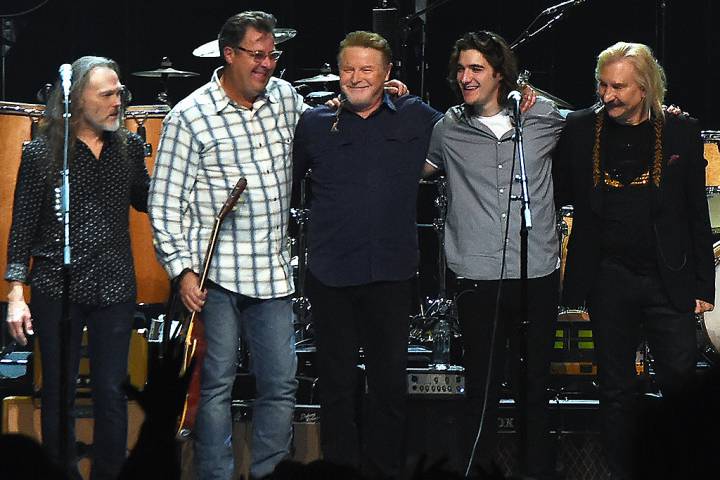At 77 years old, legendary guitarist Don Felder — the man who crafted the haunting guitar lines of “Hotel California” — is finally breaking his silence. In a blistering and emotional tell-all, Felder lays bare the secrets, betrayals, and backroom power plays that tore apart one of America’s most beloved rock bands. Behind the shimmering harmonies and Grammy-winning hits, he reveals, The Eagles were not a brotherhood — they were a battlefield.

For decades, fans worshipped The Eagles as paragons of California cool: a band that embodied perfection, unity, and effortless artistry. But according to Felder, that image was “a lie built on control and greed.” Once a co-owner of Eagles Ltd., Felder believed he had earned an equal seat at the table. “We were supposed to be partners,” he said. “But it became clear very quickly that there were only two people who mattered — Don Henley and Glenn Frey. Everyone else was disposable.”
The tension, he claims, began subtly — a change in profit splits here, a reworded contract there — until the structure of the band became less a collaboration and more an empire ruled by two men. “Henley and Frey were the kings,” Felder explained. “The rest of us were subjects. And if you questioned their authority, you were out.”
That power imbalance came crashing down in 2001 when Felder was fired via fax — an act so cold, so humiliating, that it sent shockwaves through the music industry. “I remember staring at that fax,” he said. “No phone call. No meeting. Just… gone. Twenty-seven years, erased by a machine.”
For years, Felder kept quiet, struggling to reconcile the love he had for the music with the betrayal he felt from those who once called him brother. But when he finally spoke through his explosive memoir, Heaven and Hell: My Life in The Eagles (1974–2001), the floodgates opened. The book shattered the pristine mythology surrounding the band, exposing Henley and Frey’s iron-fisted leadership, creative manipulation, and relentless control over every dollar and decision. “It wasn’t a band,” Felder said. “It was a corporation. And I was a shareholder who got forced out.”
The legal war that followed was vicious. Felder sued Henley and Frey for wrongful termination and breach of contract, revealing that the band’s harmony had been an illusion long before their breakup. Though the case was quietly settled out of court in 2007, Felder emerged scarred but unbroken. “I didn’t want revenge,” he said. “I wanted my truth back.”
Now, more than two decades later, Felder is entering his golden years with renewed purpose — and a clear conscience. Following a health scare on stage earlier this year, he returned to assure fans that he’s still standing strong. “Music saved me,” he said. “It’s the one thing they couldn’t take from me.”

His upcoming album, The Vault: 50 Years of Music, promises to be his most personal yet — a reflection on fame, loss, and redemption. “I’ve spent my life trying to make peace with what happened,” Felder admitted. “But the truth is, I wouldn’t be who I am without the pain.”
And perhaps most surprising of all, he now speaks of forgiveness — not as a reconciliation, but as release. “I’ve let go of the anger,” he said. “I forgave them, not for them — for me. Because you can’t carry that bitterness forever.”
Still, the bitterness lingers in the public memory. Fans can’t forget that the men behind “Peaceful Easy Feeling” and “Take It Easy” were locked in one of the ugliest rivalries in rock history. And while Henley continues to tour under The Eagles’ banner, Felder’s absence remains a wound that never quite healed. “I’m proud of what we created,” he said. “But I’ll never forget how it ended.”
At 77, Don Felder stands not as a bitter exile, but as a survivor — a man who lost everything, then built himself anew. His guitar still sings with the same haunting energy that made Hotel California immortal, and his voice — once silenced by contracts and control — now rings louder than ever.
“They tried to erase me,” he says, smiling. “But I was part of the song. And you can’t erase the song.”






